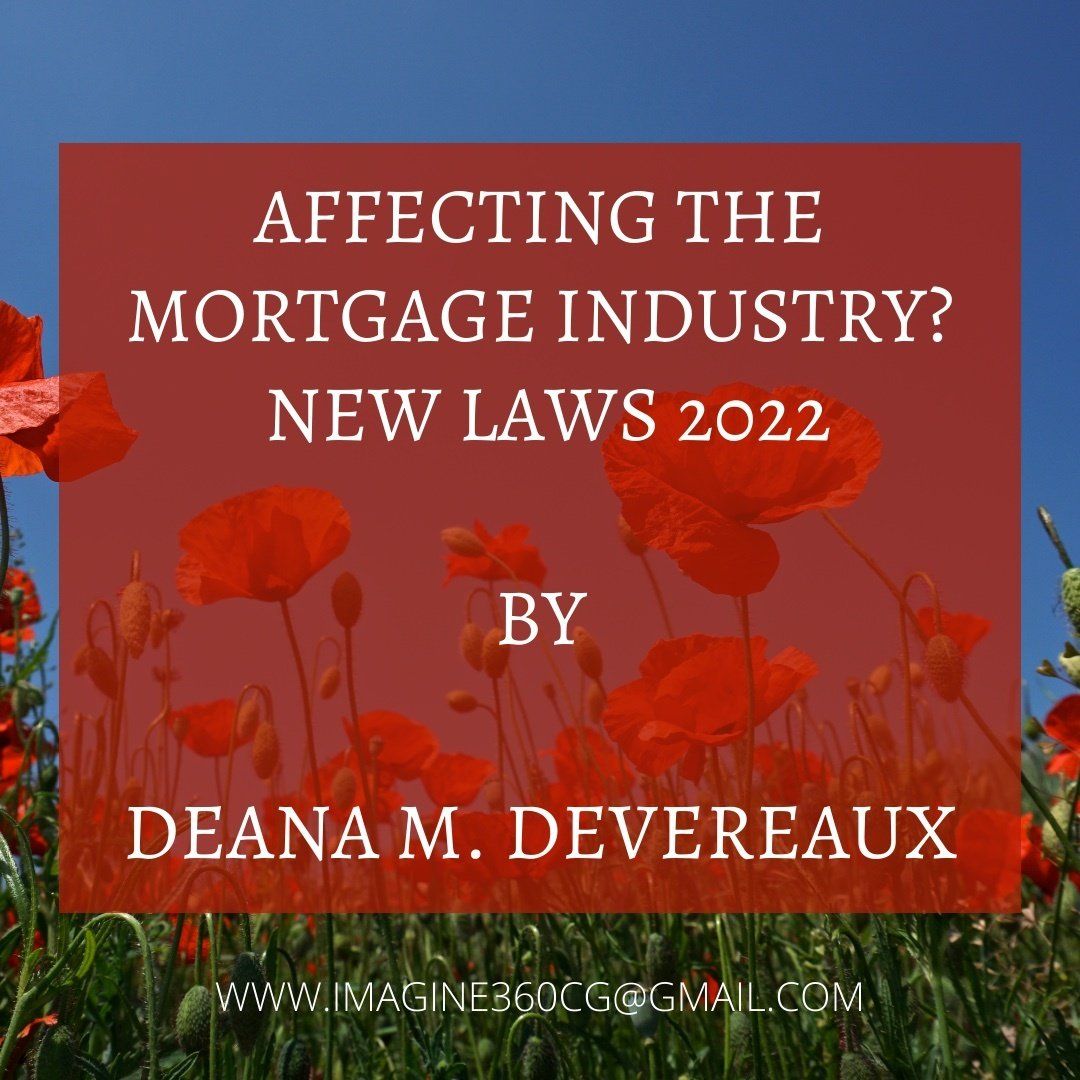8 MORTGAGE TYPES YOU SHOULD KNOW
Deana M. Devereaux • August 5, 2020
Thinking about buying a house, but not quite sure what loan to pursue?

Not to worry. Below are eight types of mortgage loans you should be familiar with:
1. CONVENTIONAL / FIXED RATE MORTGAGE
This loan is best for home buyers who want lower monthly payments that do not fluctuate. Rates are usually your lowest with these. Your rate is FIXED; it never changes. Payments are stretched out over time. Conventional mortgages are obtainable in the following yearly terms: 10, 15, 20, 30 and even 40 years. Most of our Borrowers love the 30-year and 40-year terms, to keep their monthly payments the lowest. We recommend these for Borrowers with great credit, income, assets and easy, provable ability to repay.
2. ADJUSTABLE RATE MORTGAGE (ARM)
You guessed it. Your rate adjusts after a specified fixed period with this mortgage type. Most common are your 5/1 ARM and 7/1 ARM loans. These simply mean that your rate and payment is locked for the first 5 or 7 years and then adjusts annually thereafter. ARM rates are usually lower, resulting in lower payments for the fixed periods. These mortgages can be extremely beneficial to homebuyers and investors who: 1) Will not be in the property for long-term and/or definitely plan to refinance later with a lower rate (hopefully); 2) Plan on selling the property before the fixed period is up. After the fixed-rate period ends, the interest rate on an ARM loan moves based on the index of the markets.
3. INTEREST-ONLY MORTGAGE
We tend to recommend these mortgages for our fix and flip and other investors. It is to their benefit to pay the least amount possible before fixing and selling their property. These mortgages do not pay down any principal, only interest. While the lower payments are quite attractive initially, if there is no plan in place, you are only renting the money. Most Borrowers have admitted they were not disciplined enough to make periodic principal payments in addition to the interest.
If Borrowers are disciplined enough, however, to pay down their principal balances through large annual bonuses, or increases in cashflow, each year, then MAYBE these could work. As low as rates are, though, with principal, interest, taxes and insurance all lumped into one payment, why bother with the worry?
4. FHA LOANS
FHA’s…these are guaranteed by the Federal Housing Administration. There is built-in mortgage insurance to protect against the possibility of not being able to repay the loan (that you will pay for as a rolled-in loan cost, btw). If your credit is a bit shaky, FHA will give you a chance. Before COVID, FHA loans accepted credit scores down to 500.
The required down payments are also smaller with these loans, at only 3.5%. There are even 100% financing capabilities through FHA-based programs, that combine a first and a second loan.
5. VA LOANS
Salute! These are the loans for our awesome veterans of the United States armed forces to buy homes, with no money down. These loans are guaranteed by the Department of Veteran Affairs. There is no mortgage insurance, but there is a VA funding fee required.
6. USDA LOANS
Looking to purchase or refinance rural properties (and some suburban, as well)? USDA home loans backed/issued by the U.S. Department of Agriculture are for you! These loans also have no down payment for most properties. There are many loans and grants available for home improvement, as well.
7. BALLOON LOAN
We DEFINITELY always recommend these for investors who move property and conduct real estate transactions often. Many are conducting mergers, expanding business capabilities, etc. These loans benefit Borrowers who need shorter periods of time for a loan, for instance, 1-3 years. For 1-3 years, they will pay interest only. At the end of the fixed period, the total principal amount is due. It will be all bad if that total principal is not rectified after the fixed period.
8. JUMBO
Jumbos are the bee’s knees right now. Most of these were suspended during the start of COVID and still are. We are still funding these, however! Contact us if you need one. We have great rates! These loans refer to a mortgage that is too large for the Federal Government (Fannie/Freddie) to purchase or guarantee. Limits range per state, county, etc. Some states like California have prices so high that ranges fall into a high-balance category before it reaches the Jumbo level.
Borrowers who transact with more expensive/luxury homes benefit from these loans, whether purchasing or refinancing.
If you have any questions on any of these mortgage loans, give us a call, today!
CHECK OUT SOME OF OUR RECENT BLOG POSTS

It’s important to stay up to date on the ever-changing landscape that is the mortgage industry. It’s possible that the newest laws passed by congress, Fannie Mae, and Freddie Mac could affect those looking to get a mortgage, or refinance in the coming months. We’ve put together all the latest on the newest and upcoming mortgage laws affecting the industry. Additional due diligence for condo buyers If you’re looking at buying a condo that is 20 years or older, you may have to jump through a few extra hoops before signing the final loan docs. Conventional loan buyers will have to go through an additional due diligence process that includes obtaining answers on safety, soundness, structural integrity, and habitability of condos from the condo association before the loan can be processed. If you’re looking at a condo this spring, it’s best to get prepared now. While this extra due diligence step is a pain, it’s in your and your lenders best interest. This extra due diligence step was born out of the devastation of recent condo building collapses in the U.S. New fees for vacation home financing and high-balance loans If you thought 2022 was the year for. A second home, vacation home or jumbo upgrade, it may still be but you’re going to be looking at additional fees. Upfront fees for these types of loans are expected to increase between 1.125 percent to 3.875 percent. Fannie Mae and Freddie Mac explain that these increases in the second home market are to keep first-time homeownership rates low and facilitate equitable and affordable housing. You can still buy down these increases with points just like you can buy down an interest rate. This rate increase comes as we saw the housing market skyrocket and borrowers take on additional debt to compete in this hot market. Self-employed borrowers rejoice – loosened regulations Thanks to the pandemic, the number of freelanced workers has increased. The good news keeps on coming because lending criteria has relaxed for self-employed borrowers. The COVID-19 pandemic saw an increase in requirements for self-employed borrowers. If you’re a freelancer, you no longer need to provide year-to-date profit and loss statements and three months of bank statements. We’re back to the good old days of using tax returns to show income! If you’ve been waiting to buy a home because you’re a self-employed borrower, now is the time! In the past, borrowers had to show creditworthiness through any number of on time loan payments including credit cards, first mortgage loans, car loans and more. The strict creditworthiness requirement affected many buyers that did not have credit cards, mortgage loans, or car loans. Now your mortgage loan provider can use a verification tool to check bank deposits for on-time rental payments, and other creditworthiness information. Say goodbye to mounds and mounds of paperwork proving you pay your loans on time!

The real estate agent that you’re working with to buy your home should be your advocate. You want to ensure that they are aware of all risks and benefits associated with the property you’re looking to buy. There is a major benefit in having a good real estate agent because they can ultimately help you make money on the purchase of your home in the long run. If your agent shows you homes where you could add an additional bedroom or bathroom or they show a property where you could finish the basement, they’re helping you gain equity in the property. On the flip side of that, if they don't understand your search area and they show you a home that is overpriced and they suggest that you go in over the true value of that home, you’re losing money on the transaction. It’s important to work with someone that you trust to guide you through the process and help you make decisions that will help your bottom line, not hurt it.

Step 1 – Decide How You’re Going to Use the Second Home Your down payment requirements and loan types will differ depending on what you plan to use your second property for. For example, do you plan to use it as a vacation home, secondary residence, or full-time rental property? A vacation home or secondary residence may qualify for a conventional home loan. When qualifying for a second conventional loan, the process is much like your first mortgage except you will be required to put down 10 percent. If you are purchasing the home to use as an investment property or full-time rental, you won’t qualify for certain loan types such as FHA or VA loans. You will also be required to put down a larger down payment than a vacation home or secondary residence. In addition, you may have to meet stricter debt to income ration requirements. All hope is not lost though! You can still qualify for a vacation home or secondary residence if you plan to rent the home out on apps like Airbnb. Typically, you must occupy the home for some portion of the year, and the home must be a one-unit home that can be used year-round. We can help you figure out what loan type you qualify for. Step 2 – Save For Your Down Payment There are multiple ways to complete this step. You can save the traditional way and put away a portion of your paycheck every month. You can also use the equity in your primary home to fund the down payment of your second home. There are multiple programs available such as: · Cash out refinance: A cash out refinance allows borrowers to borrow up to 80% of their home’s current value. The only caveat with this option is that your primary home’s monthly payment will increase. · HELOC: A HELOC, otherwise known as a Home Equity Li ne of Credit. This avenue differs from a cash out refinance because you are not refinancing your primary home’s mortgage. This is a good option if current interest rates are higher than your primary home mortgage interest rate. The last thing you want to do is refinance to a higher interest rate!

